What To Do If You Put Too Many Chemicals In Your Pool?
When it comes to maintaining a swimming pool, achieving a safe and enjoyable swimming environment entails carefully balancing the water chemistry. However, it's not uncommon for pool owners to inadvertently add excessive chemicals in their pursuit of crystal clear water. If this situation arises, it becomes crucial to take the necessary steps to correct the chemical imbalance promptly.
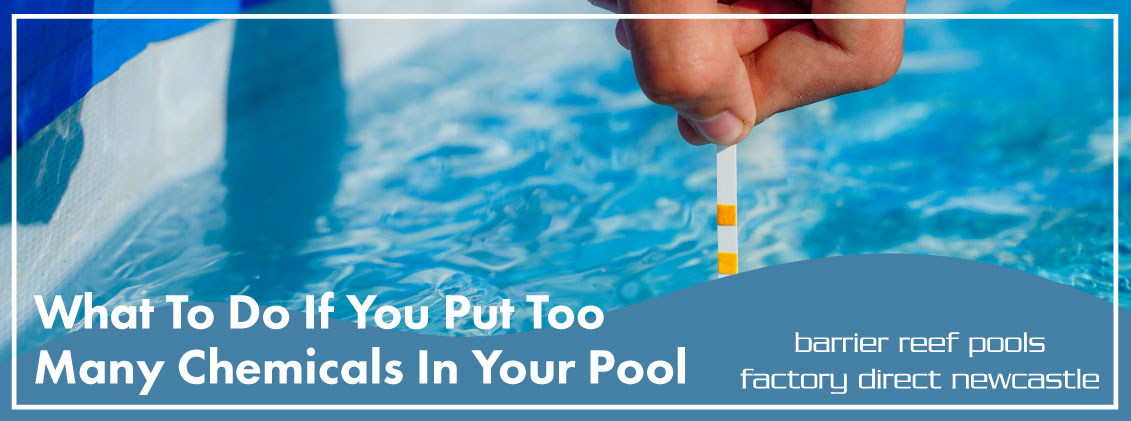
The primary chemicals commonly used in pool maintenance include chlorine, algaecides, pH balancers, and more. Should you happen to add an excessive amount of these chemicals, it can lead to various issues. These may include skin, eye, and respiratory irritations for swimmers, potential damage to the pool equipment, and, of course, less inviting swimming conditions overall. Ensuring the proper chemical balance in your pool is key to creating a safe and enjoyable swimming environment for everyone. So, it's important to be cautious and vigilant when adding chemicals to your pool, maintaining a delicate equilibrium that enhances the overall pool experience.
Here's What You Can Do:
Step One: Identify the Problem
To begin with, it is crucial to identify the specific chemical that is in excess within your pool. For example, if you notice a strong and pungent odour, it is likely an indication of elevated chlorine levels. On the other hand, if your pool water appears cloudy and murky, it could be a result of excessive algaecides. Utilising a comprehensive pool testing kit will greatly assist you in precisely pinpointing and addressing the underlying issue. By taking these necessary steps, you can effectively maintain the optimal balance and clarity of your pool water.
Step Two: Stop Swimming
It is advisable to avoid swimming until the problem is resolved. Excessive chemical levels in the water can potentially lead to various health issues, including skin and eye irritation, as well as respiratory problems. Taking precautionary measures and refraining from swimming will help ensure the well-being and safety of individuals.
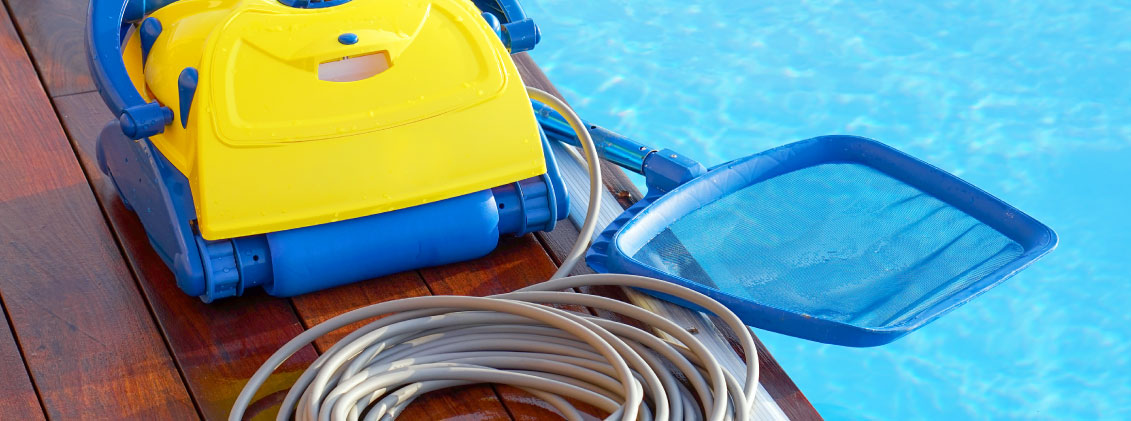
Step Three: Dilute the Chemical Levels
If you find yourself in a situation where you’ve accidentally used too much of a chemical in your pool, don’t worry! The best course of action to resolve this issue is by diluting the chemical. You can achieve this by partially draining the pool and gradually refilling it with fresh water. It’s important to remember to do this gradually, as abrupt changes can potentially disrupt the delicate chemical balance even further. By taking these steps, you’ll effectively address the problem and restore the chemical balance of your pool.
Step Four: Adjust Chemical Levels
Once you have diluted the sample, use your testing kit to verify the chemical levels. If the levels are still too high and out of balance, it is recommended to consider using a chemical reducer. These effective products, readily available at reputable pool supply stores, can assist in restoring your pool’s chemistry back to a safe and optimal range, ensuring a healthy swimming environment for you and your loved ones.
Step Five: Regular Monitoring
After properly adjusting the levels of your pool, it is crucial to maintain the chemistry on a regular basis. This practice will enable you to uphold the perfect balance and prevent any potential issues caused by over-chemicalisation in the future.
While the idea of adding too many chemicals to your pool may seem intimidating, rest assured that with the right information and a little patience, this is a problem that can be effectively resolved. Always bear in mind that when it comes to pool chemicals, less is often more. It is important to add chemicals gradually, testing the water after each addition to ensure optimal results.
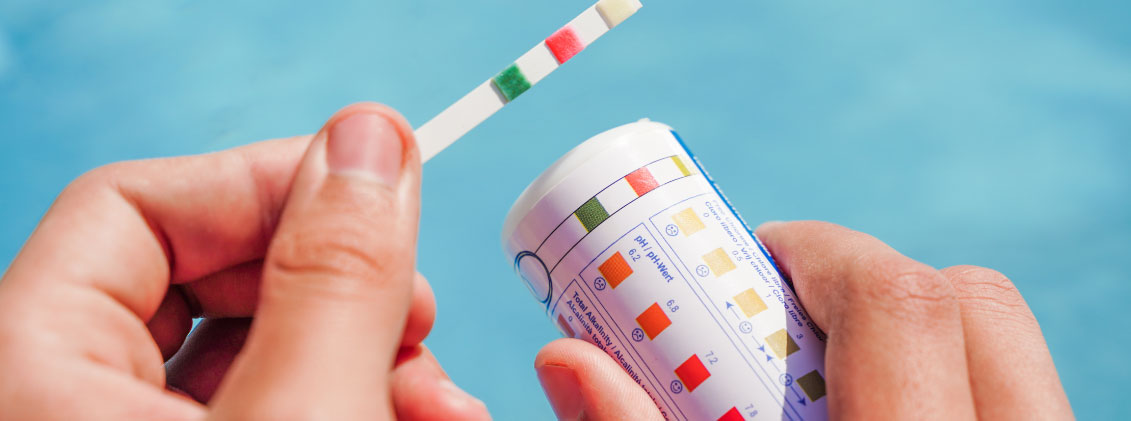
What If I Have A Fibreglass Pool?
Fibreglass pools, like any other type, also require careful chemical maintenance. However, they come with their particularities.
To start with, get a comprehensive pool testing kit suitable for fibreglass pools. Use this to measure the levels of the key chemicals – chlorine, pH balancers, algaecides etc. in your pool. These measurements will help you identify any excesses.
If you’ve added too many chemicals, refrain from swimming until you’ve corrected the imbalance. The next step would also involve dilution – partially drain the pool and refill it with fresh water, doing so slowly to prevent further disruption of the chemical balance.
If the chemical levels remain high after dilution, consider using a chemical reducer designed specifically for fibreglass pools. These are available at most pool supply stores.
Remember, the nature of fibreglass may cause it to react differently to chemicals compared to other pool types. So, always ensure to use products that are safe for fibreglass pools. Regular monitoring and adjustment of the chemical levels is crucial to maintaining a safe and enjoyable swimming environment.
Finally, always proceed with care when adding chemicals to your fibreglass pool. Add gradually, monitor the change, and remember that when it comes to pool chemicals, less is often more.
In the event that you encounter severe over-chemicalisation and your DIY methods do not seem to be effective, it is advisable to seek professional assistance. Pool maintenance professionals possess the expertise, knowledge, and specialised tools necessary to safely and efficiently restore your pool to its ideal condition. By entrusting the task to experts, you can have peace of mind knowing that the safety and comfort of all pool users are guaranteed.
To Sum Up
Maintaining a well-balanced pool is an ongoing process that requires regular attention, adjustment, and continuous monitoring. By comprehending the role of each chemical and understanding the impact of their levels in your pool, you can ensure a safe, clean, and inviting swimming experience for everyone. Remember, a little extra care and attention can go a long way in maintaining the beauty, functionality, and longevity of your pool.
If you are currently in search of a high-quality, durable fibreglass pool, look no further than Newcastle Swimming Pools. Our company, based in Heatherbrae, Newcastle, specialises in providing exceptional fibreglass pools that are designed to withstand the test of time. We would love to assist you and your family in finding the perfect fibreglass pool that suits your backyard and meets your specific requirements.
What To Do If You Put Too Many Chemicals In Your Pool?
When it comes to maintaining a swimming pool, achieving a safe and enjoyable swimming environment entails carefully balancing the water chemistry. However, it's not uncommon for pool owners to inadvertently add excessive chemicals in their pursuit of crystal clear water. If this situation arises, it becomes crucial to take the necessary steps to correct the chemical imbalance promptly.
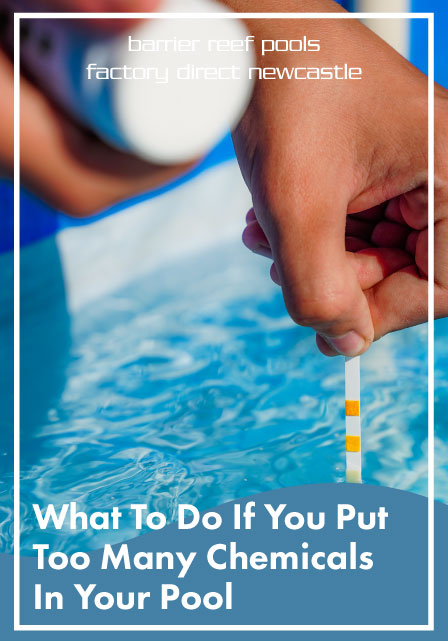
The primary chemicals commonly used in pool maintenance include chlorine, algaecides, pH balancers, and more. Should you happen to add an excessive amount of these chemicals, it can lead to various issues. These may include skin, eye, and respiratory irritations for swimmers, potential damage to the pool equipment, and, of course, less inviting swimming conditions overall. Ensuring the proper chemical balance in your pool is key to creating a safe and enjoyable swimming environment for everyone. So, it's important to be cautious and vigilant when adding chemicals to your pool, maintaining a delicate equilibrium that enhances the overall pool experience.
Here's What You Can Do:
Step One: Identify the Problem
To begin with, it is crucial to identify the specific chemical that is in excess within your pool. For example, if you notice a strong and pungent odour, it is likely an indication of elevated chlorine levels. On the other hand, if your pool water appears cloudy and murky, it could be a result of excessive algaecides. Utilising a comprehensive pool testing kit will greatly assist you in precisely pinpointing and addressing the underlying issue. By taking these necessary steps, you can effectively maintain the optimal balance and clarity of your pool water.
Step Two: Stop Swimming
It is advisable to avoid swimming until the problem is resolved. Excessive chemical levels in the water can potentially lead to various health issues, including skin and eye irritation, as well as respiratory problems. Taking precautionary measures and refraining from swimming will help ensure the well-being and safety of individuals.
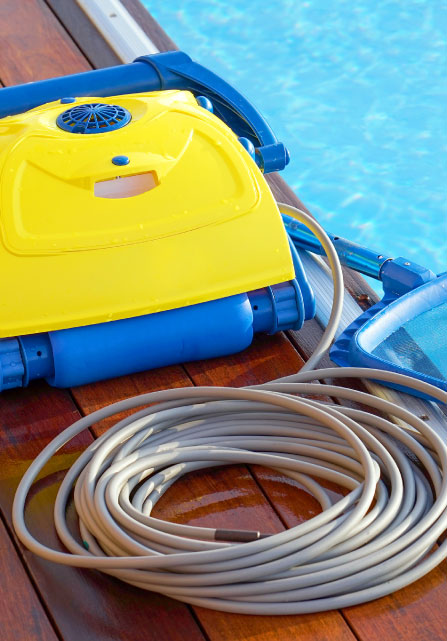
Step Three: Dilute the Chemical Levels
If you find yourself in a situation where you’ve accidentally used too much of a chemical in your pool, don’t worry! The best course of action to resolve this issue is by diluting the chemical. You can achieve this by partially draining the pool and gradually refilling it with fresh water. It’s important to remember to do this gradually, as abrupt changes can potentially disrupt the delicate chemical balance even further. By taking these steps, you’ll effectively address the problem and restore the chemical balance of your pool.
Step Four: Adjust Chemical Levels
Once you have diluted the sample, use your testing kit to verify the chemical levels. If the levels are still too high and out of balance, it is recommended to consider using a chemical reducer. These effective products, readily available at reputable pool supply stores, can assist in restoring your pool’s chemistry back to a safe and optimal range, ensuring a healthy swimming environment for you and your loved ones.
Step Five: Regular Monitoring
After properly adjusting the levels of your pool, it is crucial to maintain the chemistry on a regular basis. This practice will enable you to uphold the perfect balance and prevent any potential issues caused by over-chemicalisation in the future.
While the idea of adding too many chemicals to your pool may seem intimidating, rest assured that with the right information and a little patience, this is a problem that can be effectively resolved. Always bear in mind that when it comes to pool chemicals, less is often more. It is important to add chemicals gradually, testing the water after each addition to ensure optimal results.
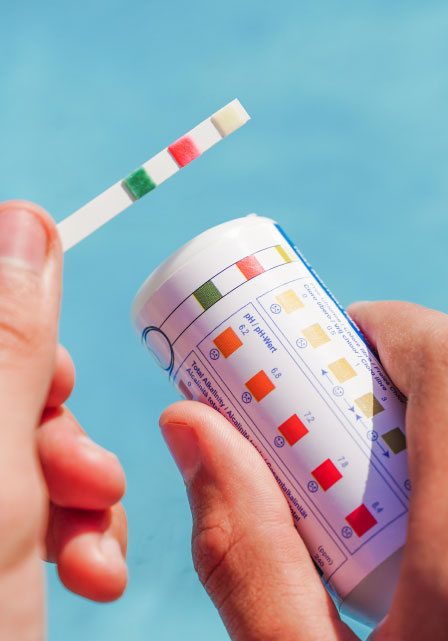
What If I Have A Fibreglass Pool?
Fibreglass pools, like any other type, also require careful chemical maintenance. However, they come with their particularities.
To start with, get a comprehensive pool testing kit suitable for fibreglass pools. Use this to measure the levels of the key chemicals – chlorine, pH balancers, algaecides etc. in your pool. These measurements will help you identify any excesses.
If you’ve added too many chemicals, refrain from swimming until you’ve corrected the imbalance. The next step would also involve dilution – partially drain the pool and refill it with fresh water, doing so slowly to prevent further disruption of the chemical balance.
If the chemical levels remain high after dilution, consider using a chemical reducer designed specifically for fibreglass pools. These are available at most pool supply stores.
Remember, the nature of fibreglass may cause it to react differently to chemicals compared to other pool types. So, always ensure to use products that are safe for fibreglass pools. Regular monitoring and adjustment of the chemical levels is crucial to maintaining a safe and enjoyable swimming environment.
Finally, always proceed with care when adding chemicals to your fibreglass pool. Add gradually, monitor the change, and remember that when it comes to pool chemicals, less is often more.
In the event that you encounter severe over-chemicalisation and your DIY methods do not seem to be effective, it is advisable to seek professional assistance. Pool maintenance professionals possess the expertise, knowledge, and specialised tools necessary to safely and efficiently restore your pool to its ideal condition. By entrusting the task to experts, you can have peace of mind knowing that the safety and comfort of all pool users are guaranteed.
To Sum Up
Maintaining a well-balanced pool is an ongoing process that requires regular attention, adjustment, and continuous monitoring. By comprehending the role of each chemical and understanding the impact of their levels in your pool, you can ensure a safe, clean, and inviting swimming experience for everyone. Remember, a little extra care and attention can go a long way in maintaining the beauty, functionality, and longevity of your pool.
If you are currently in search of a high-quality, durable fibreglass pool, look no further than Newcastle Swimming Pools. Our company, based in Heatherbrae, Newcastle, specialises in providing exceptional fibreglass pools that are designed to withstand the test of time. We would love to assist you and your family in finding the perfect fibreglass pool that suits your backyard and meets your specific requirements.


